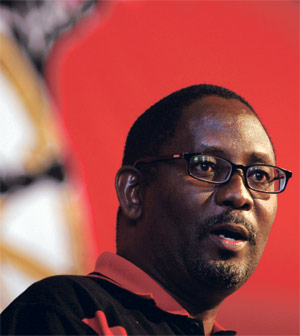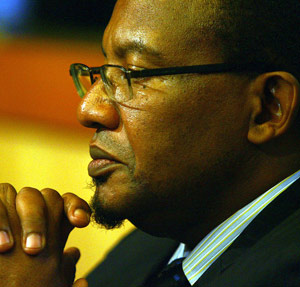The leaking of the Special Browse ‘Mole†report arguably did more than any other event to tilt the balance of forces between the Scorpions and their foes in the Jacob Zuma camp.
Full report (PDF)
Click here to read the full browse mole report![]() |
|
The top-secret report, dated July 12 2006, was faxed to Cosatu general secretary Zwelenzima Vavi on May 7 2007.
A hard copy was posted too, making sure that one of Zuma’s staunchest supporters got access to the document.
Why? Because exposing the Browse was a propaganda coup:
- For the most part, it consisted of speculative research into the sources of funding for Zuma’s legal and political campaigns. It showed the Scorpions were targeting Zuma in areas far beyond the corruption case against him, bolstering claims of a politically motivated investigation;
- It allowed opponents of the Scorpions to argue that the unit was involved in illegal ‘intelligence gathering†activities;
- Its claims of plots of insurrection in support of Zuma were far fetched, allowing the wholesale dismissal of other issues raised in the report about the funding of Zuma’s fightback against Mbeki — notably more credible suggestions he was receiving political and material support from Angola and Libya. The leak effectively inoculated Zuma against further scrutiny; and
- Its leakers were no doubt aware that the Browse had received attention at the highest levels, meaning the top brass of the Scorpions and the National Prosecuting Authority (NPA) would be drawn into the scandal.
And so it proved.
By May 17 Cosatu had distributed the Browse to its affiliates. By May 26 it was in the newspapers and by May 30 President Thabo Mbeki felt obliged to instruct the national security council to set up an investigative task team, led by the National Intelligence Agency’s (NIA) Arthur Fraser, to probe the leaked document.

Zwelenzima Vavi It was this official probe that was cleverly used against Mbeki and his allies.
Most crucially, it gave the NIA licence to secretly monitor the conversations of Scorpions boss Leonard McCarthy, in an operation that allowed NIA earlier this year to ‘legally†confirm the authenticity of the McCarthy intercepts somehow obtained by Zuma’s attorney Michael Hulley.
It was, of course, these McCarthy intercepts that gave the NPA reason to discontinue its prosecution of Zuma.
The Browse investigation also turned the spotlight on Scorpions senior special investigator Ivor Powell, suspected of being the author of the Browse report.
Powell served as a de facto special agent for McCarthy, providing him with intelligence and advice. He had long been regarded as a strategic and potentially vulnerable target to discredit the Scorpions.
Powell, a former journalist, was regarded as being a conduit of Scorpions leaks to the media — one of the major complaints of the Zuma camp.
Indeed, the Natioanal Security Council (NSC) task team found that the Browse report was ‘leaked to a journalist†months before it was leaked to Cosatu, and laid these leaks at Powell’s door. To date, the council has disclosed no evidence to back the claim.
In addition, in June 2007 the SACP wrote a letter of complaint to Parliament’s joint standing committee on intelligence, asking it also to investigate the Browse report.
By the end of July 2007 the NSC task team had concluded a preliminary investigation that rejected the
Browse report as disinformation fed by apartheid-era ‘information peddlers†bent on sowing mistrust to undermine the ANC government.
The report also formed a key plank in the attack against National Director of Public Prosecutions (NDPP) Vusi Pikoli at the Ginwala hearings.

Vusi Pikoli Despite the fact that McCarthy reported to Mbeki, not to the NDPP, Pikoli was criticised for not doing more to rein in McCarthy and for not acting when the first draft of the Browse report was shown to him in March 2006.
Further details of the task team findings emerged in February 2008, with the release of the parliamentary committee’s report in response to the SACP complaint.
It added fuel to the flames already licking at Powell and McCarthy.
The report noted: ‘The task team has demonstrated that the leaked document originated from the senior special investigator, Mr Ivor Powell, and thereafter found its way to the public through the peddlers and the media.
‘In this regard the task team found that McCarthy did not want to accept that the Browse Mole Report was leaked by Ivor Powell.â€
The committee found that the report had been authorised by McCarthy and that the Scorpions were engaged in illegal intelligence gathering. It recommended legal action against McCarthy and Powell.
Why Powell should have leaked a document so predictably damaging to his organisation was not explained.
But by this time the sustained surveillance of Powell had led to a crime intelligence-driven police raid on him in January 2008, which delivered no more than a charge of driving over the alcohol limit and — probably more crucially — access to his phone and several memory sticks.
Now Powell has spoken out, revealing that McCarthy told him to continue the Browse investigation after Pikoli had ordered it stopped.
He has disclosed that a later draft of the report — as yet unpublished — was submitted to McCarthy.
He has also queried why the task team never interviewed him and how it concluded he was responsible for the leaks.
These are simply two of the myriad questions raised by this saga. Powell’s disclosures are no more than the start to providing the answers.
Also read Smoke and mirrors
Browse Mole chain of events
- July 12 2006
The top secret document known as the Browse report is completed, the first draft having been seen by Vusi Pikoli in March the same year.
- May 7 2007
The report is leaked. A fax is sent to Cosatu’s Zwelenzima Vavi and a hard copy is posted to make sure he gets it.
- May 17
By this date the report has been seen by Cosatu’s affiliates
- May 26
Newspaper reports about the leaked documents have already appeared.
- May 30
President Mbeki instructs the National Security Council to set up an investigative task team, but the official probe ends up undermining Mbeki and his allies. The investigation also leads to suspicious that Scorpions investigator Ivor Powell wrote the Browse secret report.
- June
The South African Communist Party asks Parliament’s intelligence committee to investigate the report.
- July
A preliminary investigation by the National Security Council task team says the report is misinformation intended to undermine the ANC government.
- February 2008
The task team concludes that the report was leaked by Powell and authorised by Scorpions boss Leonard McCarthy. They fail to explain why Powell would do anything to damage the Scorpions.
- January 2008
Powell is subjected to a crime intelligence driven police raid but is only charged with driving over the alcohol limit.